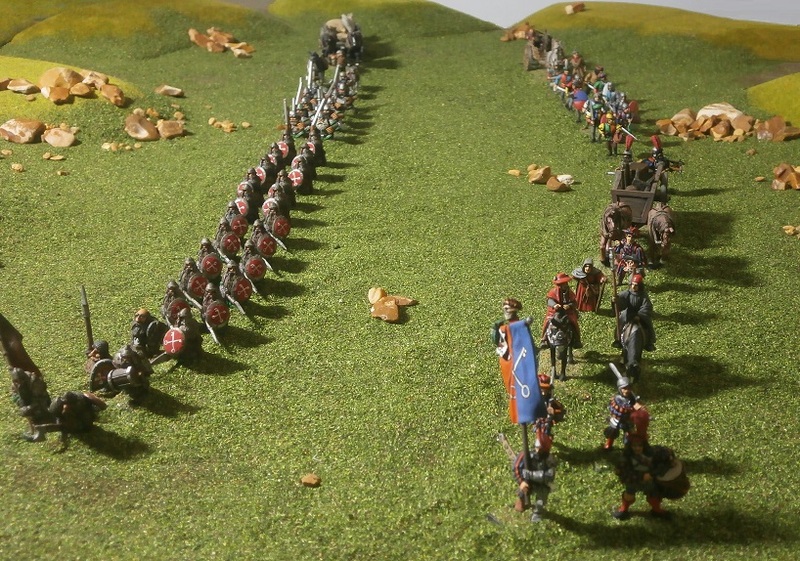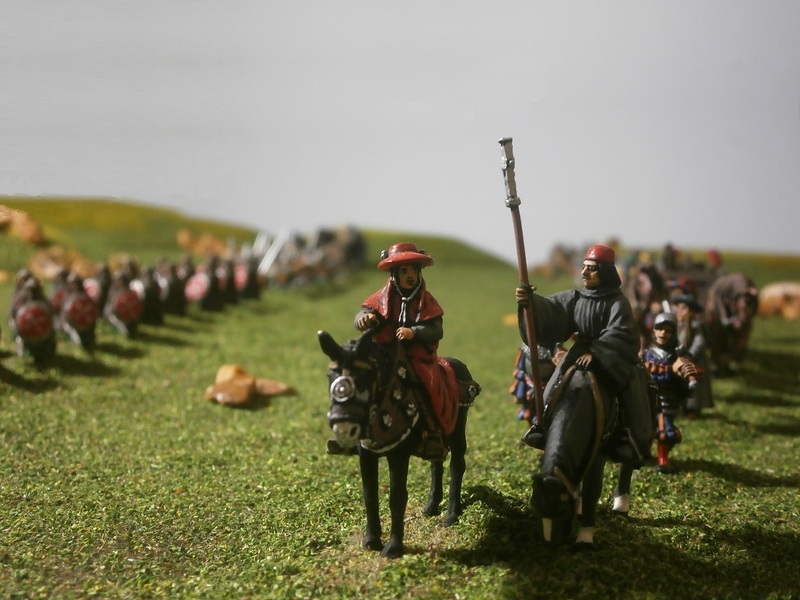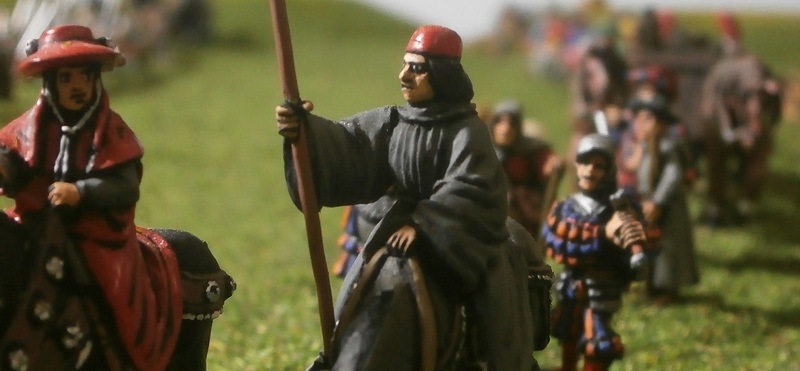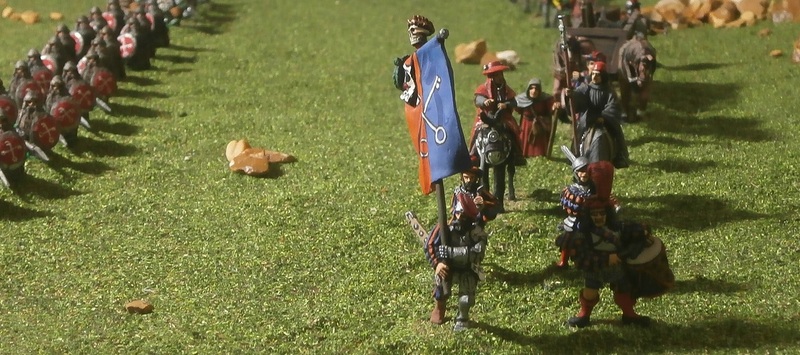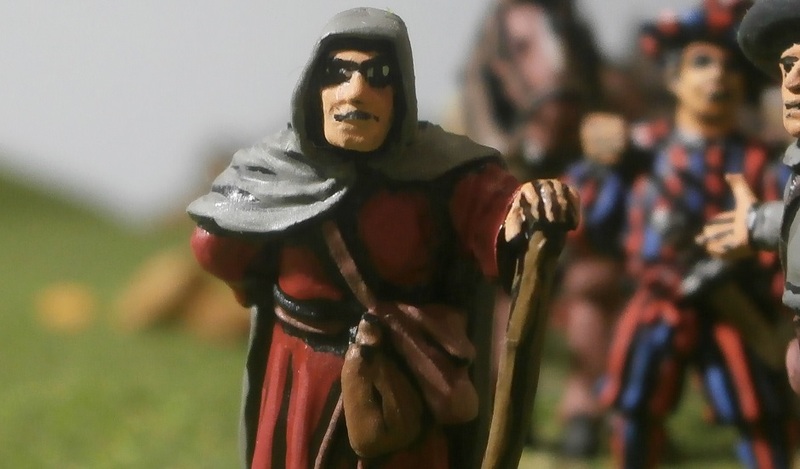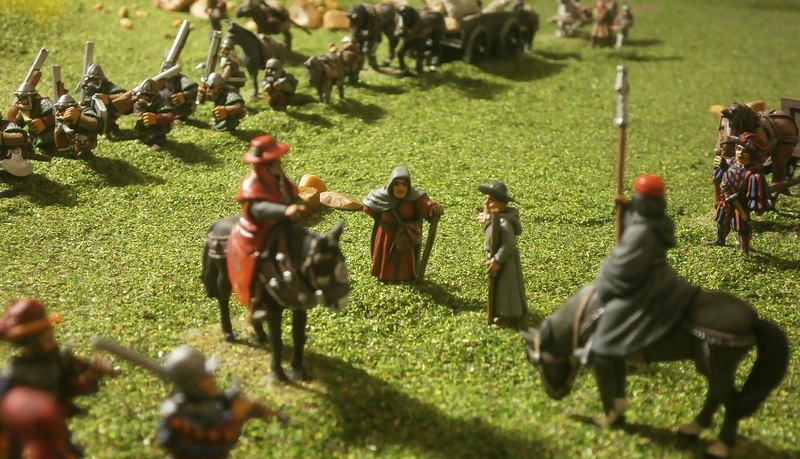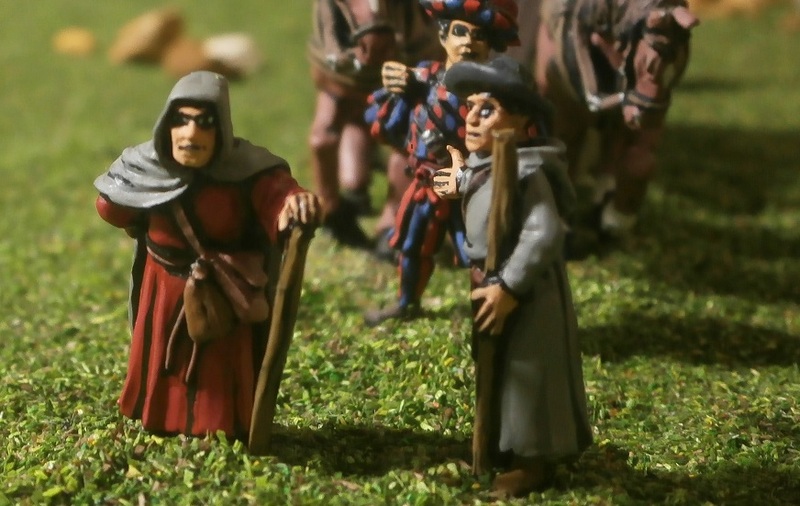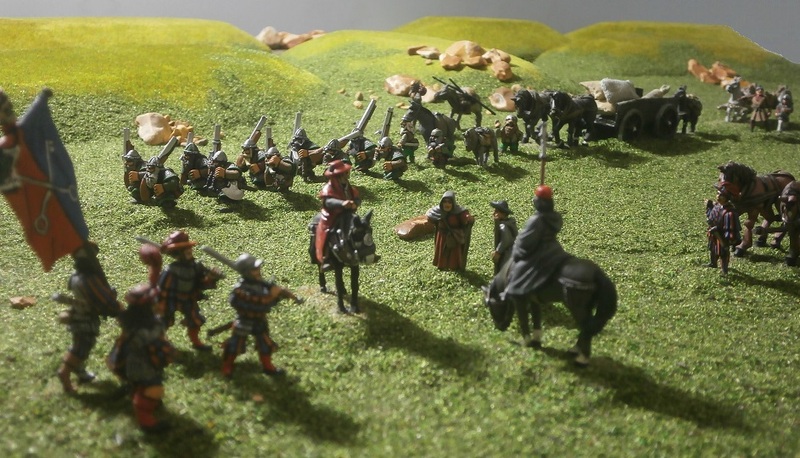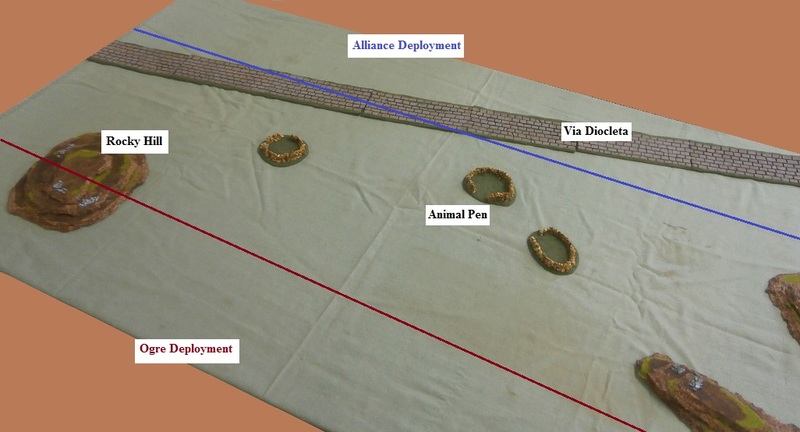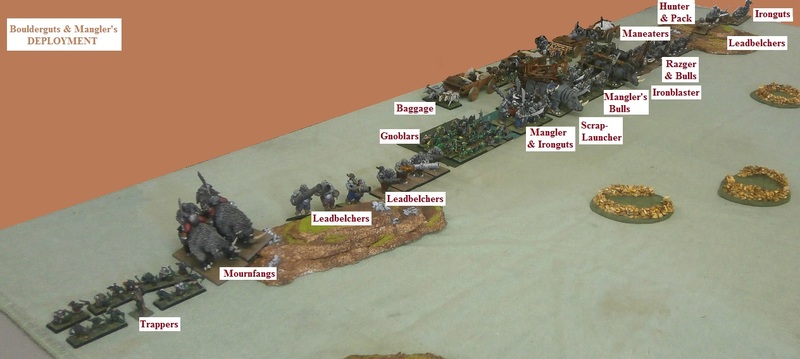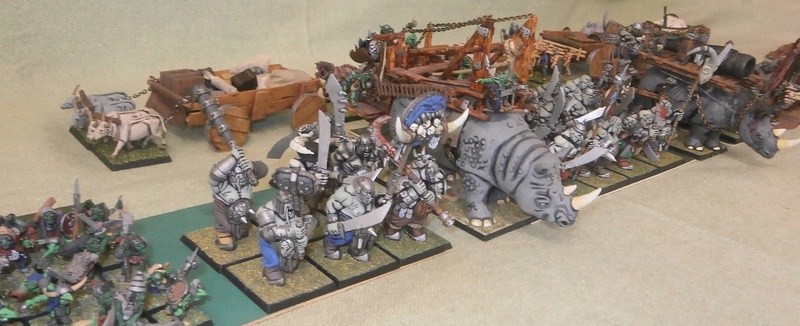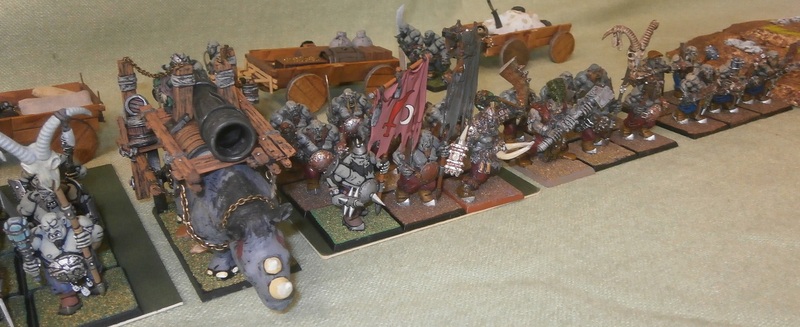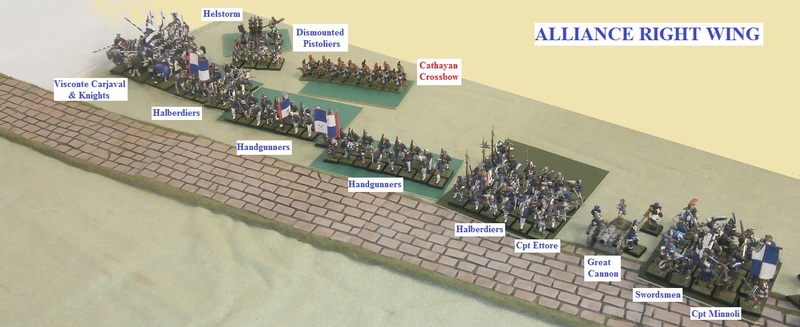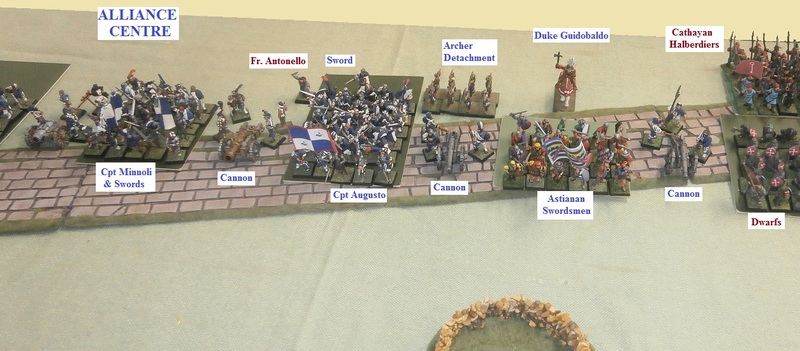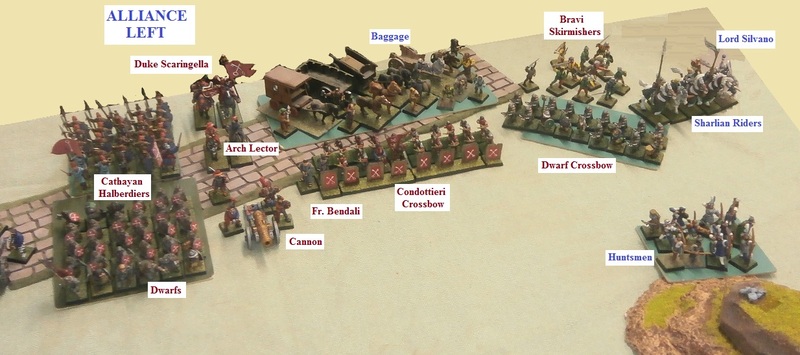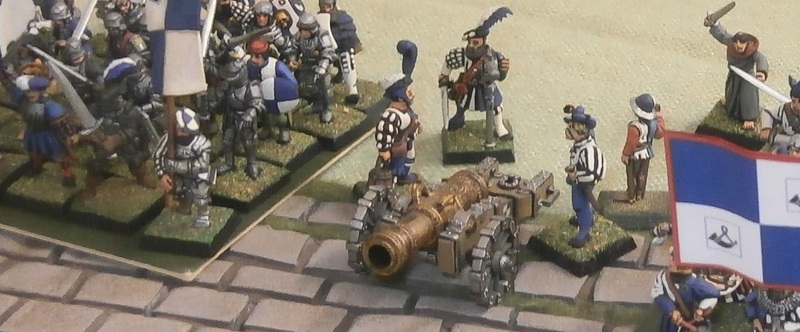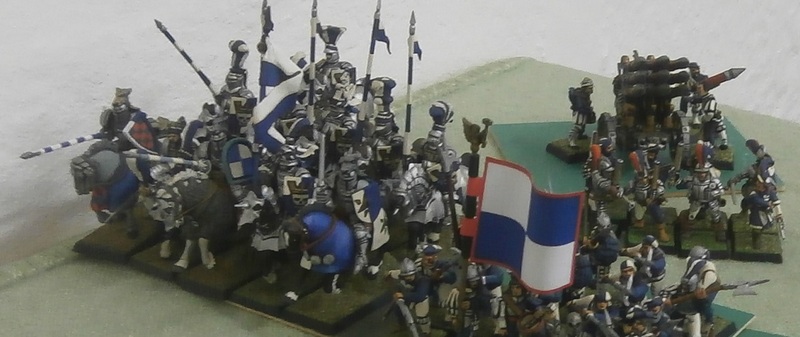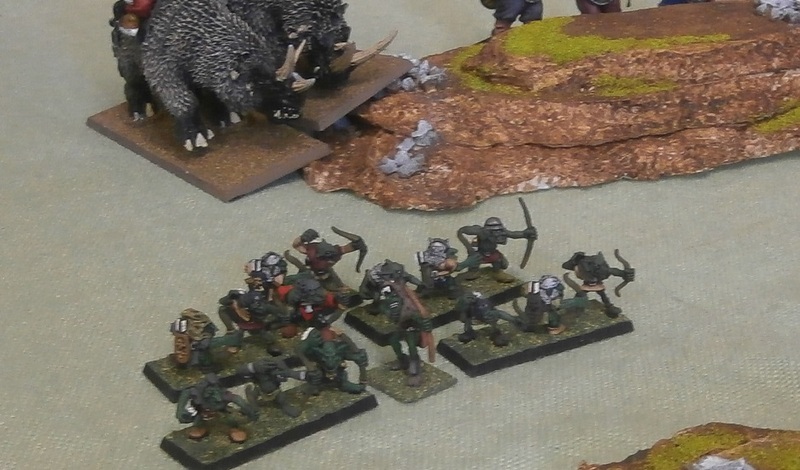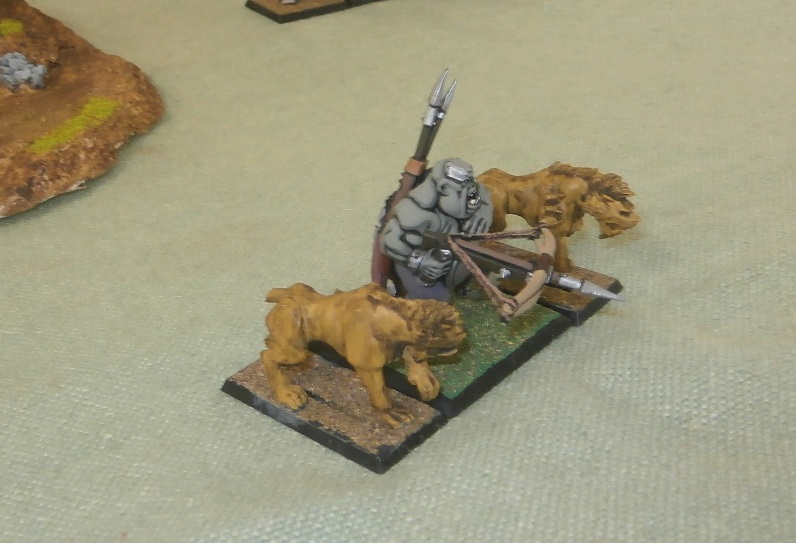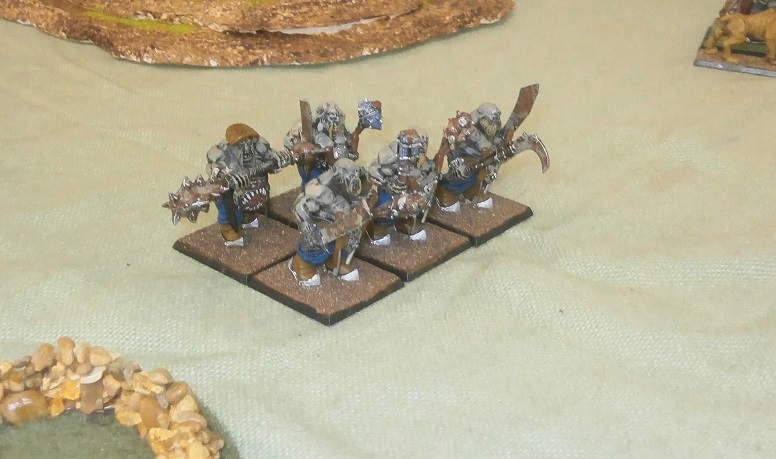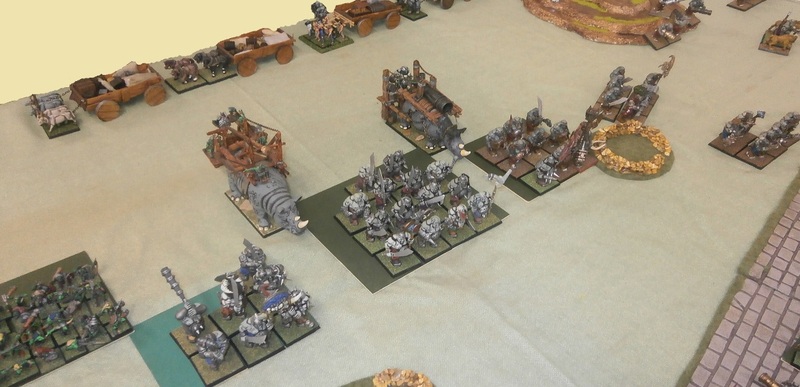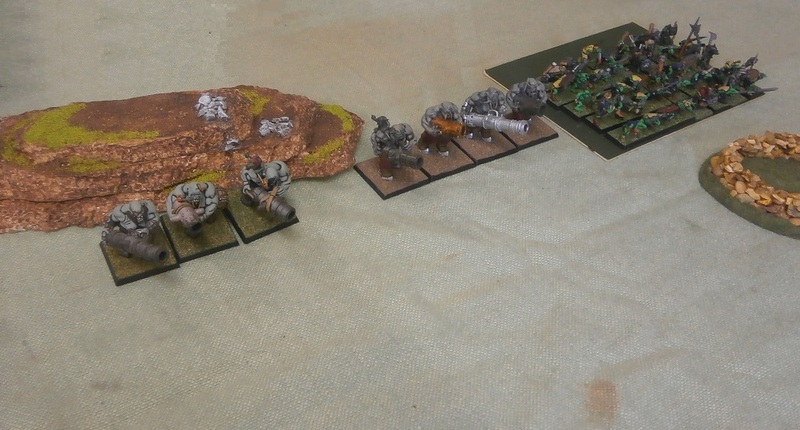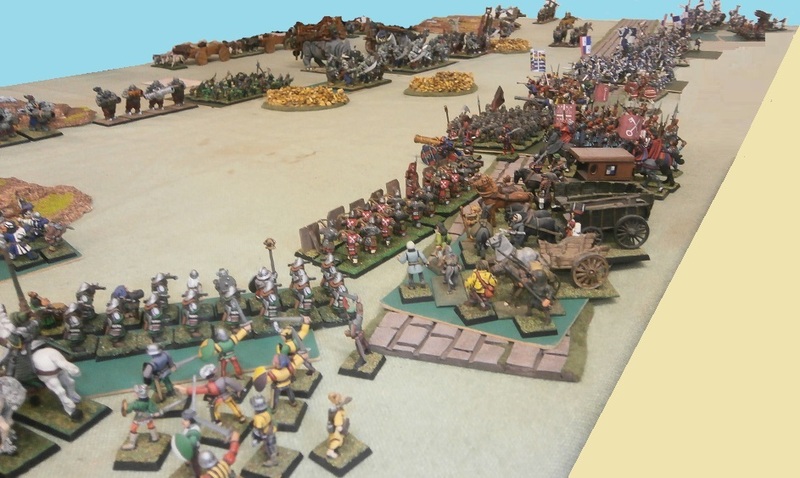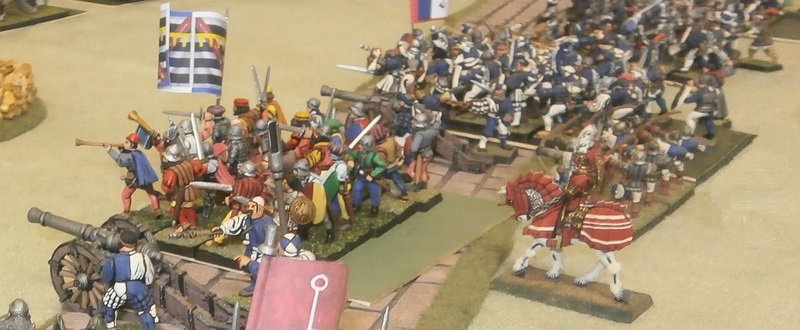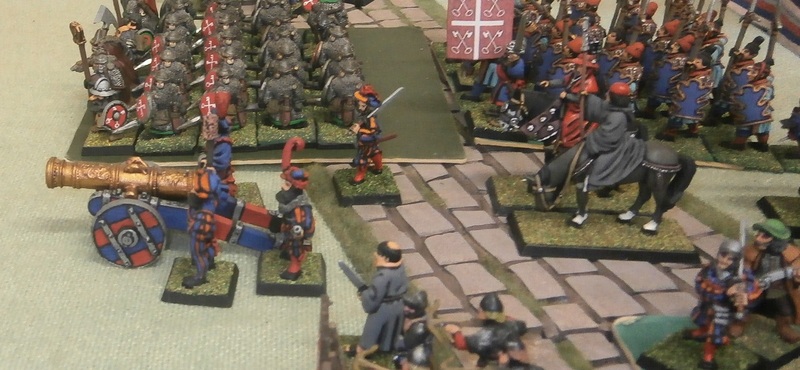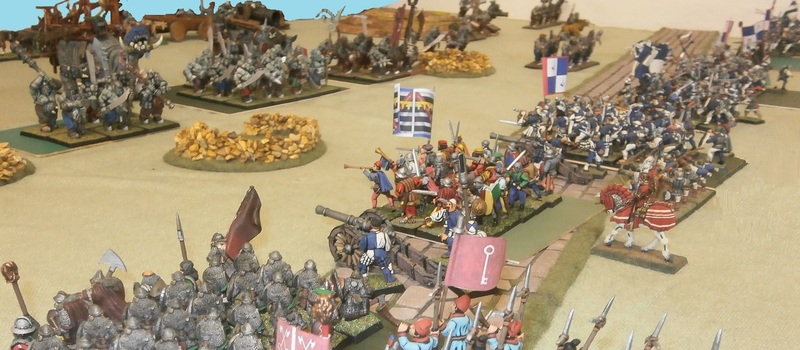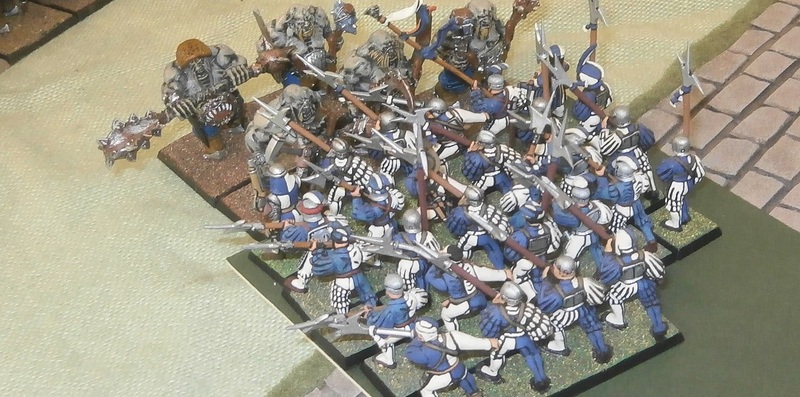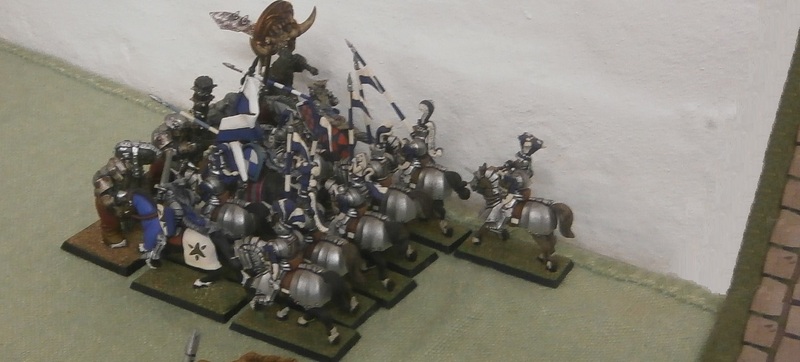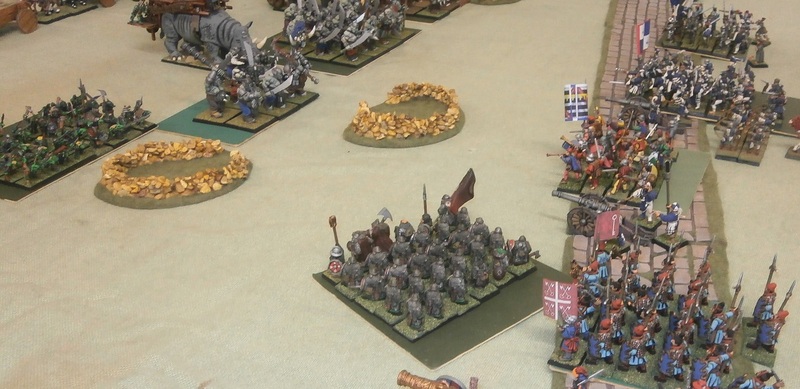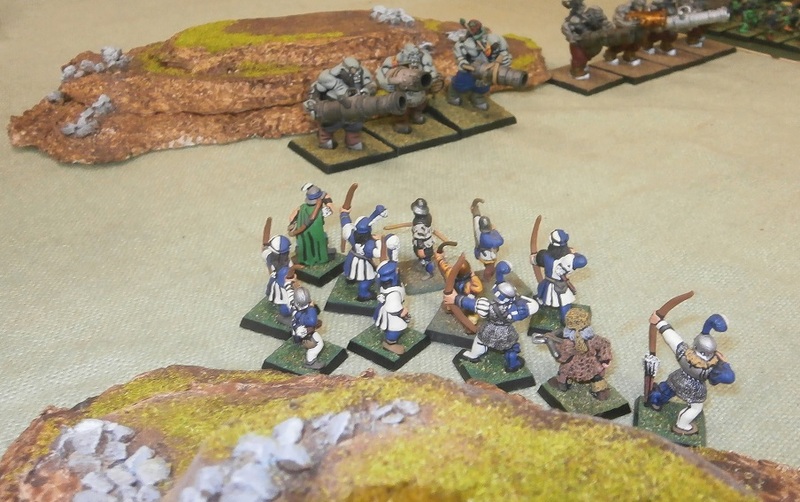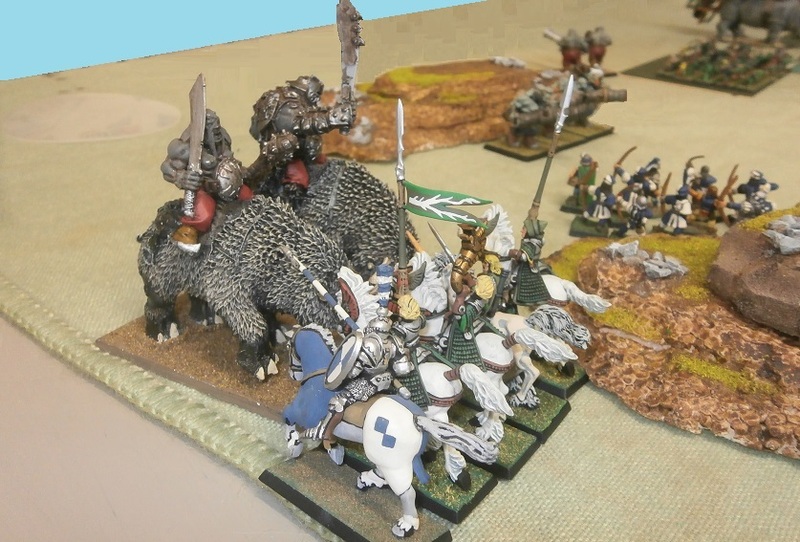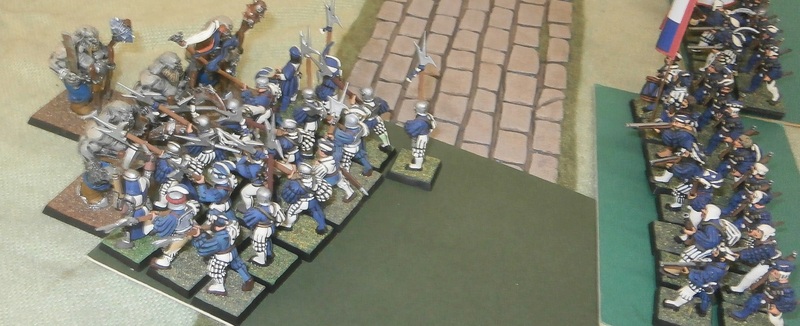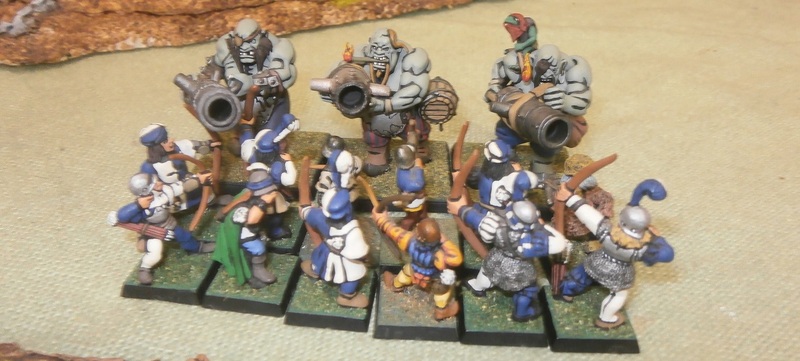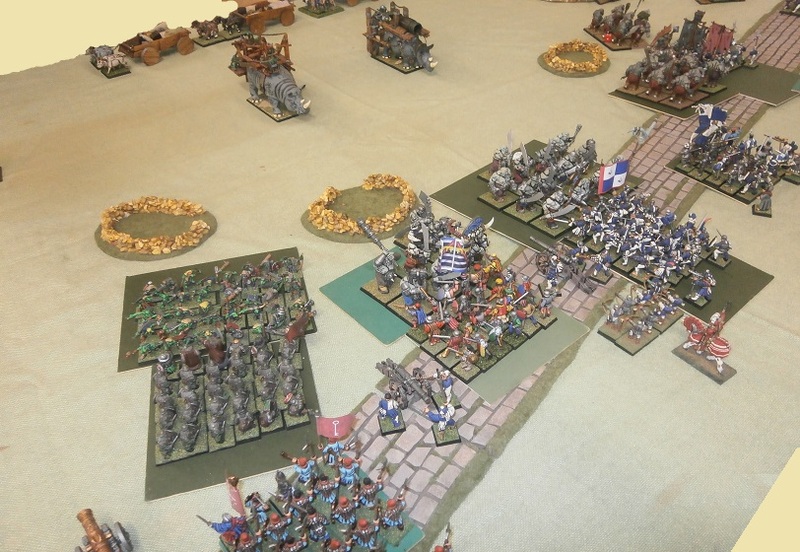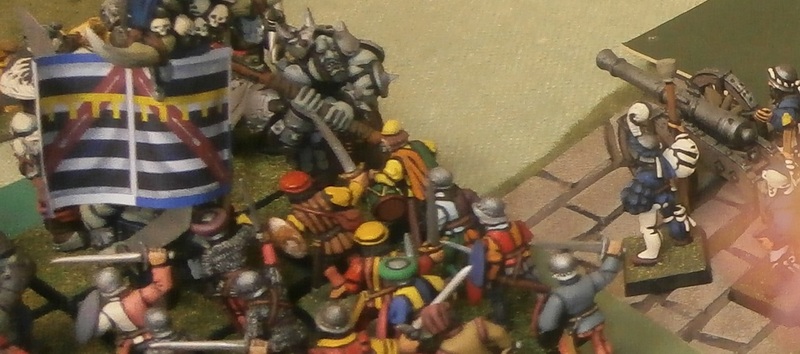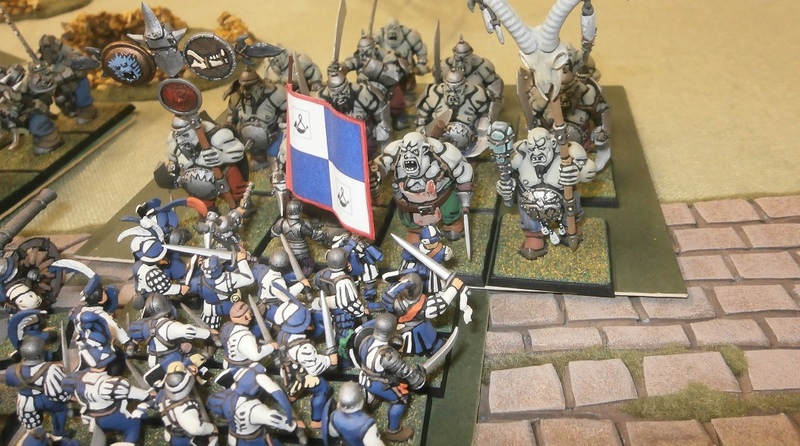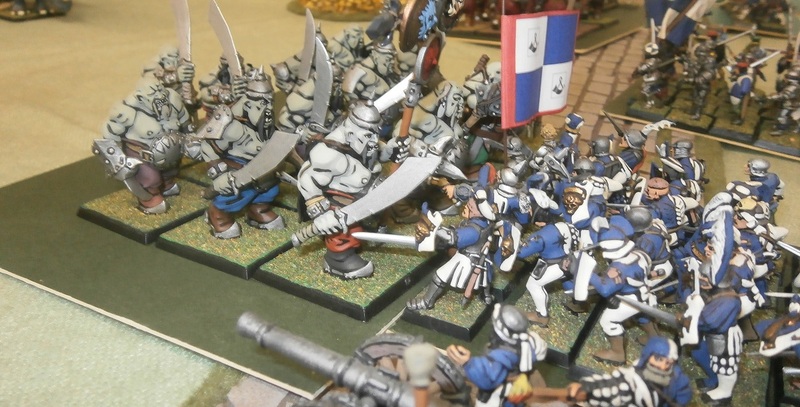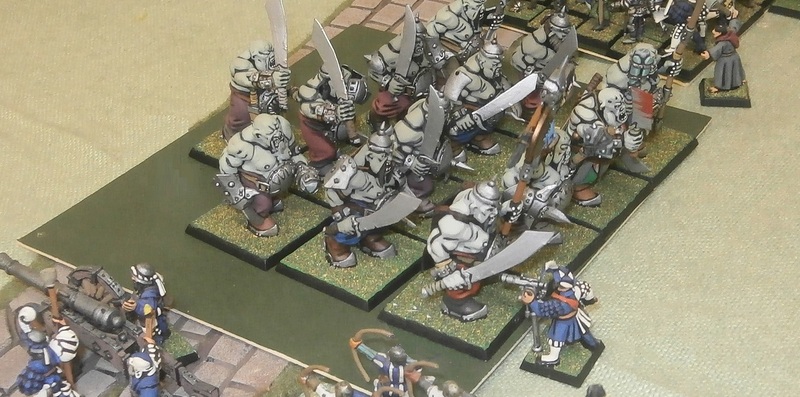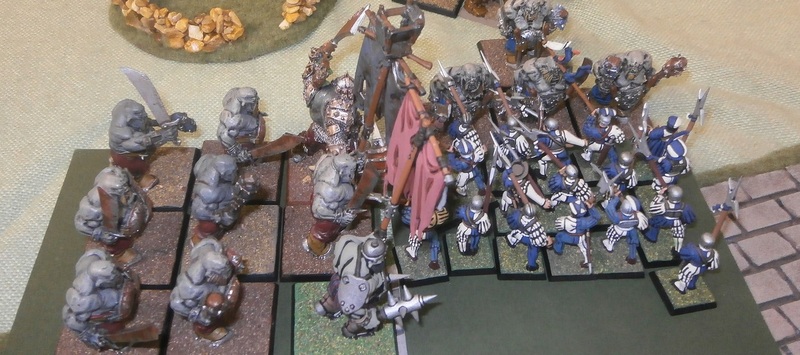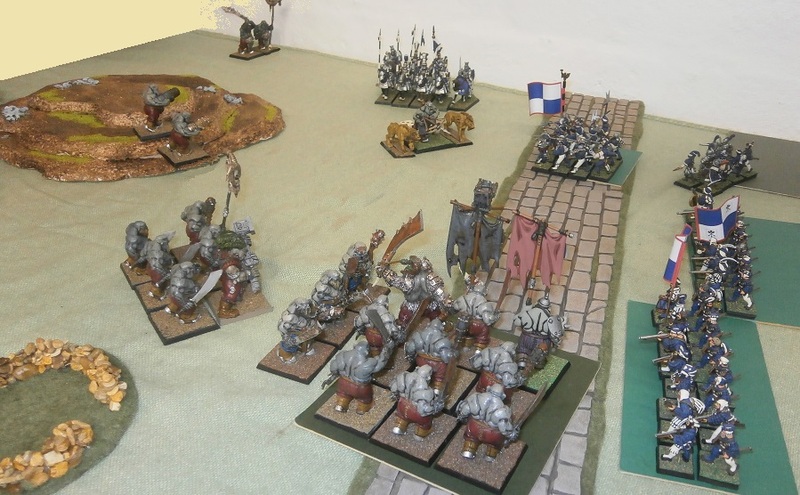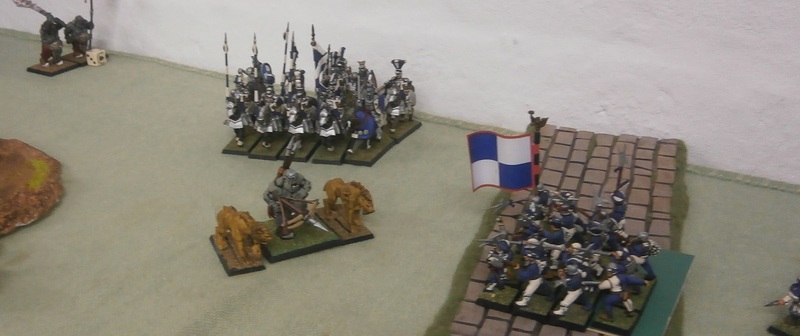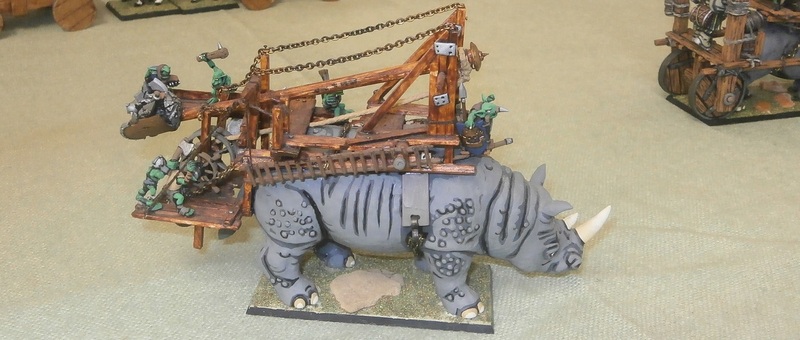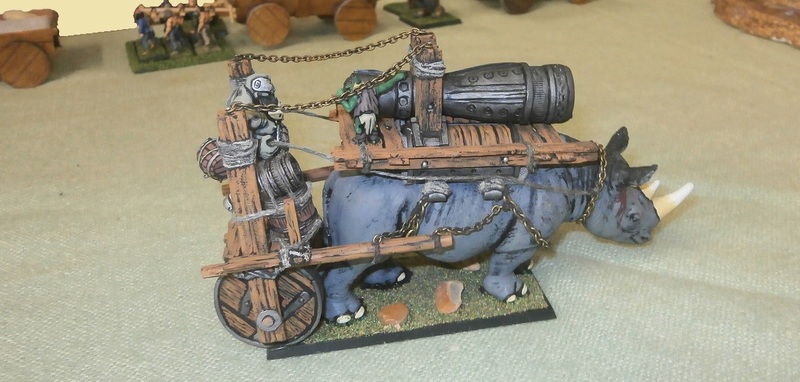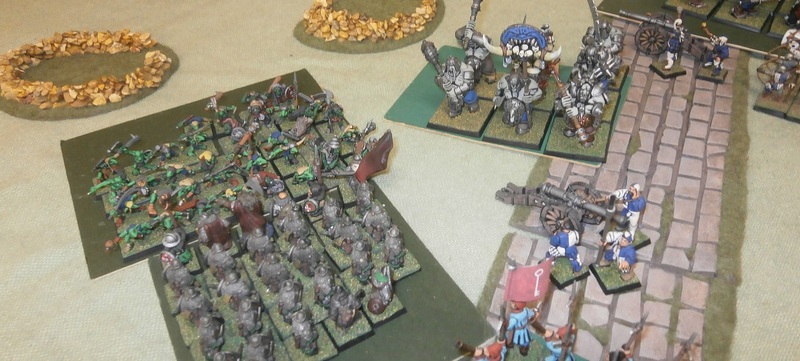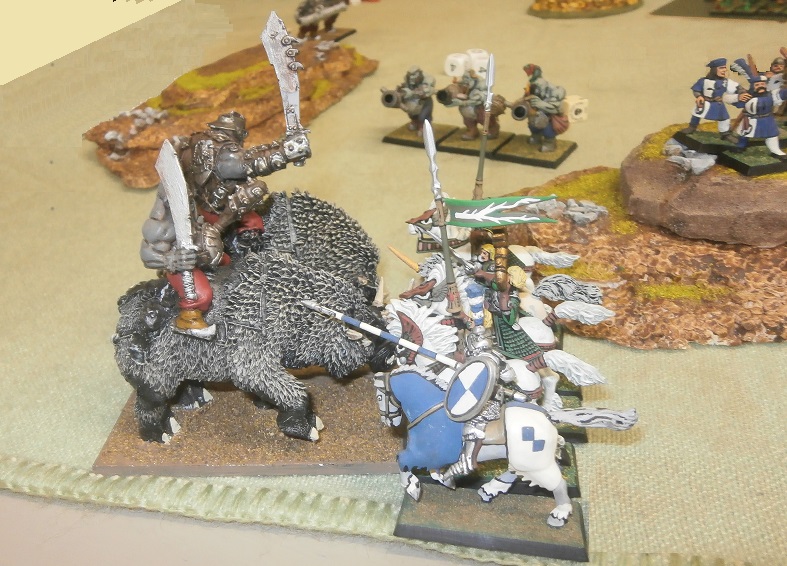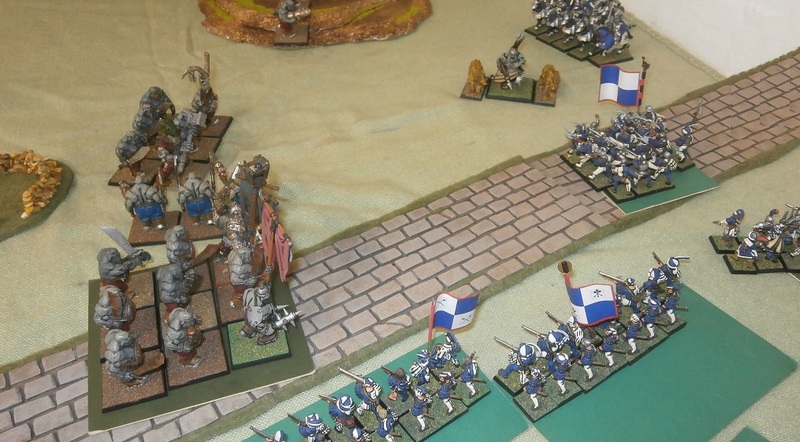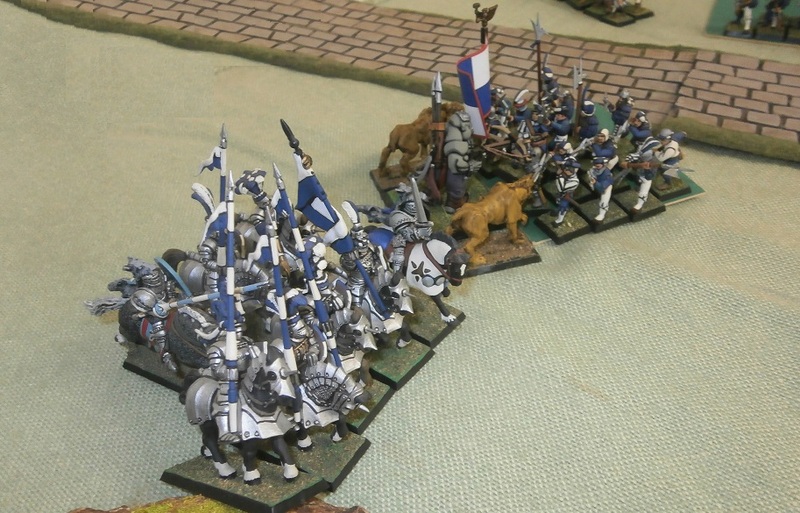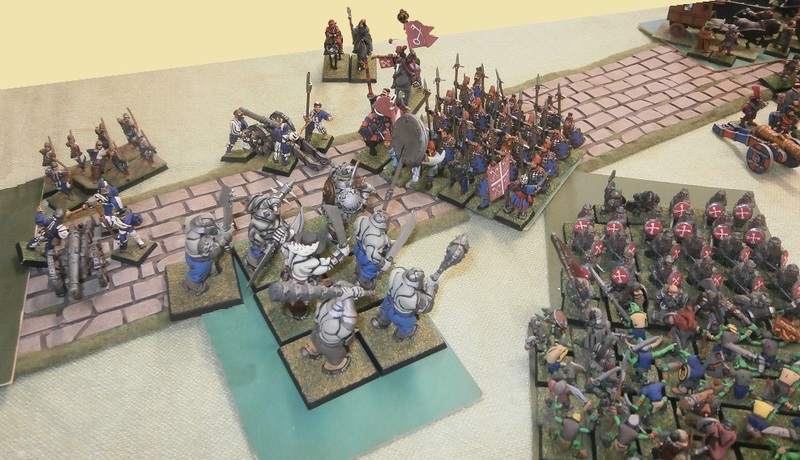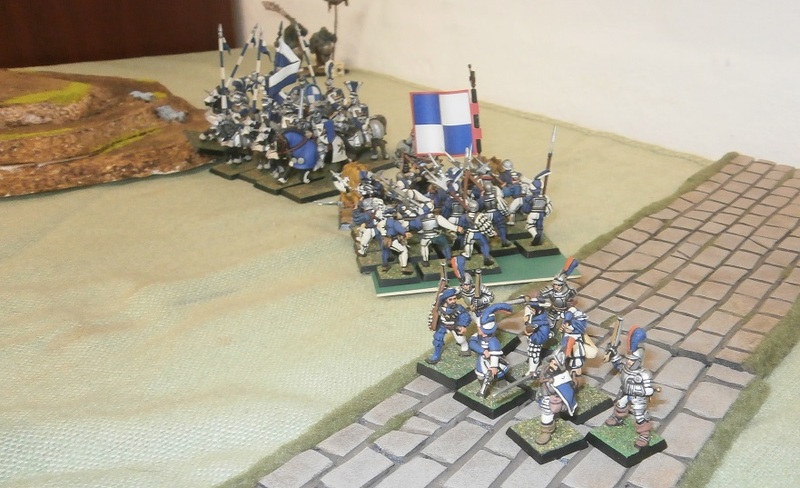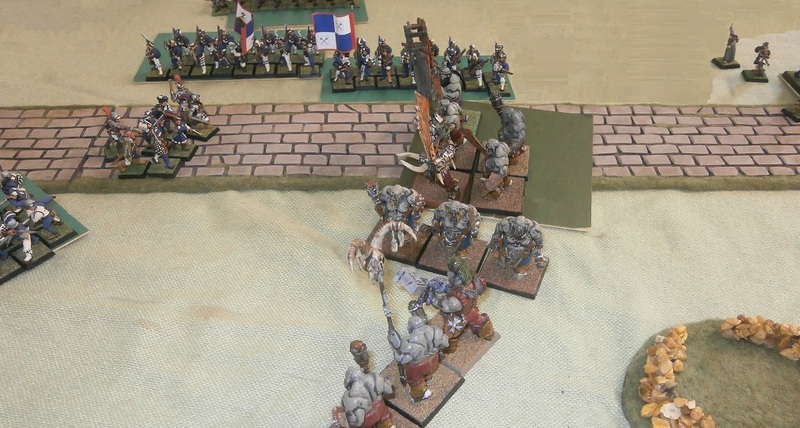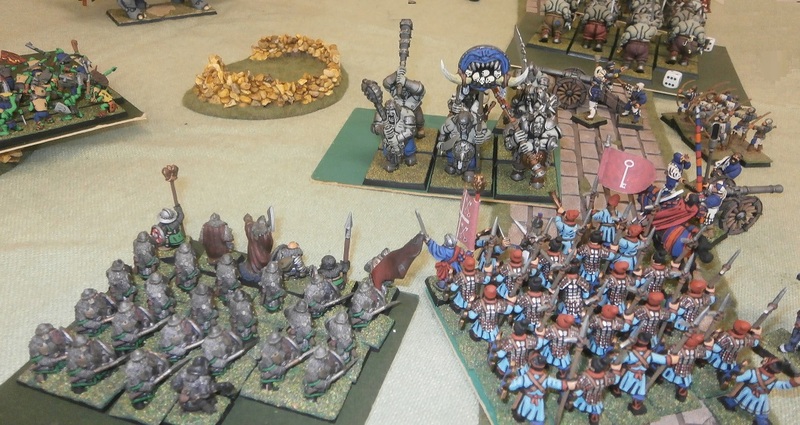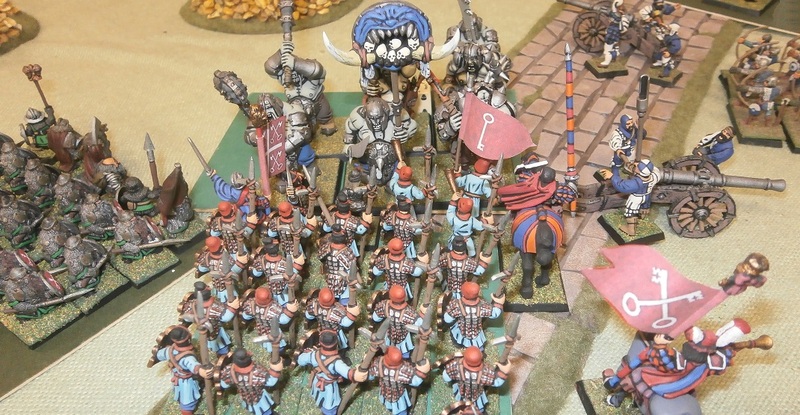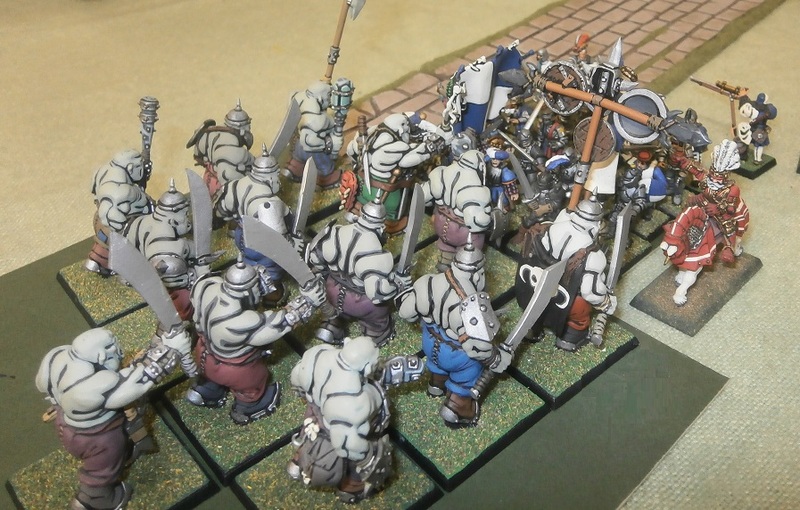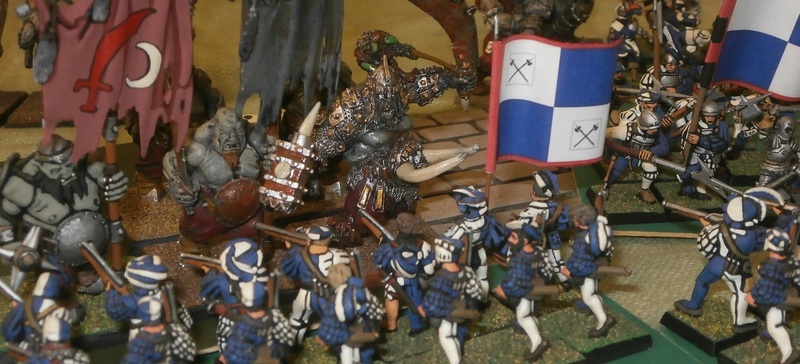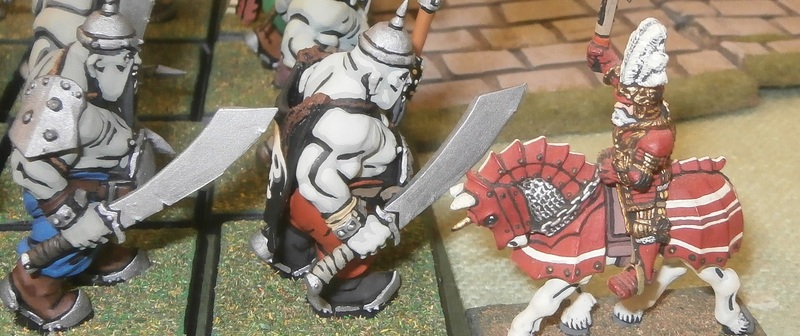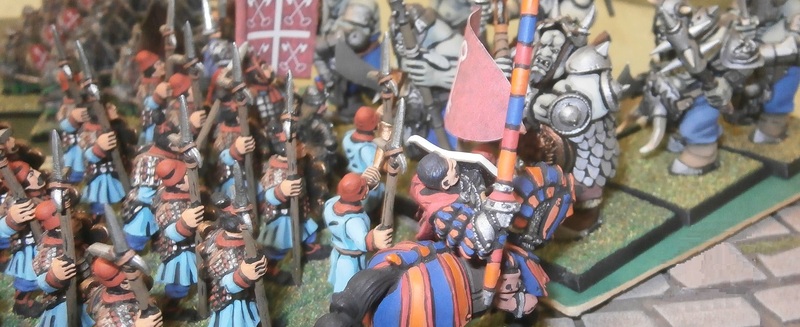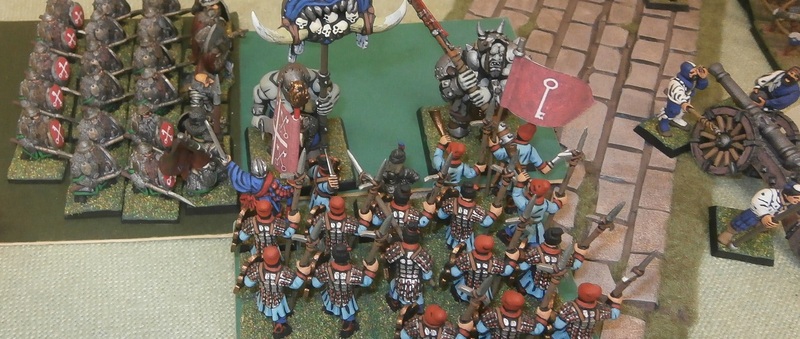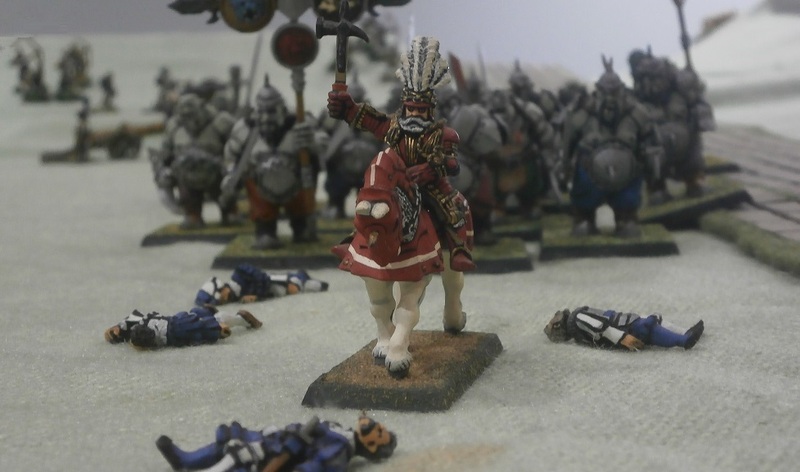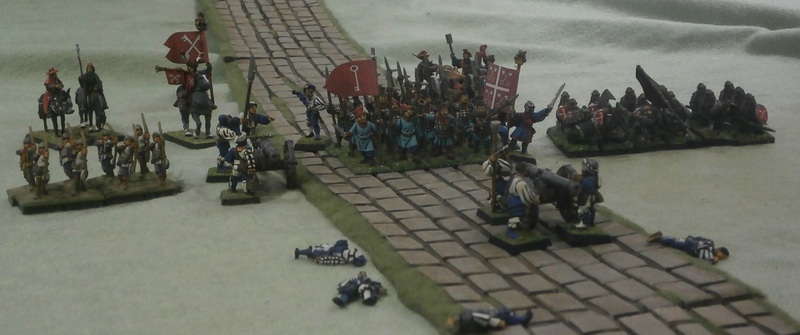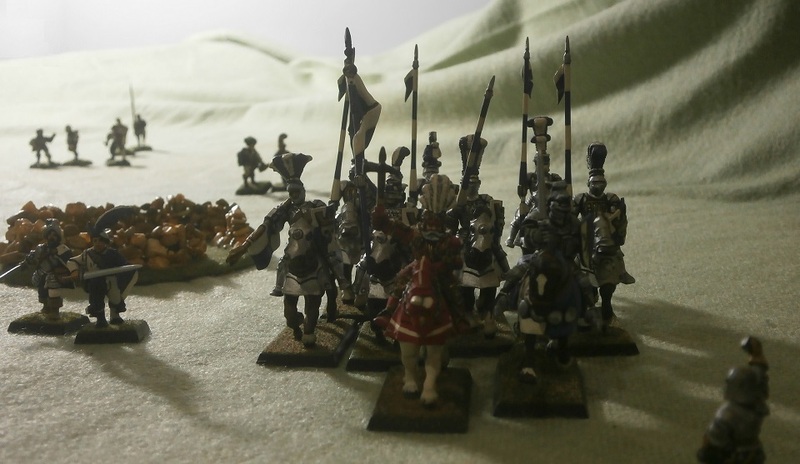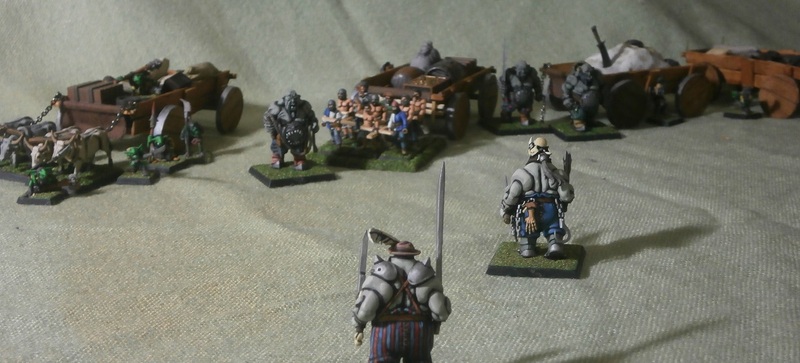Thanks Shaun. I have to admit, I really enjoy putting archaic or unusual words in, and using tricks like onomatopoeia and illteration etc.
Here's the next piece, prequel to a very large battle.
................................................................
The Battle of the Via Diocleta: Prequel
Duke Scaringella and his Reman army marched in the van, as was proper now they were moving through their own territory. The whole force, Pavonans included, was comprised mostly of foot soldiers, along with baggage and a large artillery train, which one might presume would critically limit their speed, ruining their chances of successfully catching the brute foe ahead. This was not so, however, as both armies were pushing themselves hard – the Pavonans keen to exact revenge for the multitude of insults done to them and theirs by Razger Boulderguts’ ogres, and the Remans desperate to ensure their own realm would not suffer a similar fate. Every effort had been made to ensure a good pace, including assigning the Pavonan’s large pistolier regiment to assist the artillery’s passage in every way they could. Although their poor horses would doubtless be in no fit state to fight when it came to battle, the brute foe would be subjected to battery by a storm of iron round-shot rather than the paltry peppering of leaden pistol balls.
Towards the rear of the Reman column rode the newly elected arch-lector of Morr, Bernado Ugolini. He was accompanied by several servants, a handful of guards and clergy, including his Estalian secretary Duarte, followed by a cart carrying his personal baggage and a small body of Reman militiamen who had recently become noticeably more conscientious in their duties, now that they were accompanying not merely the Lector of Viadaza, but rather the holy father of the whole Church of Morr.
The Reman cross-keyed standard was carried before Bernado, while off to his side marched a column of iron-clad dwarfen mercenaries who also sported the crossed keys, painted on their shields. They had served in the miscellaneously mercenary Reman army for more than a decade, along with regiments of Cathayans, Empire soldiers and even some elves.
In truth, Bernado would much prefer to be riding northwards directly to Remas, not chasing ogres to the south. The city and the holy church of Morr were in turmoil, since before his election to the arch-lectorship, and even more-so now. As the church’s chosen ruler, he should be there to guide his flock, heal the divisions tearing the Morrite clergy apart and ensure Morr’s protective presence. Duarte and his all his other advisers agreed, however, that the situation was now so bad there was little he could do without an army to back him, which meant travelling wherever the Reman Captain General, Duke Scaringella and his army went. When he finally returned, not only did he need to be with them, but also to be one of them.
While the arch-lector Calictus II had died at Ebino fighting against the vampire duchess, Duke Scaringella had been leading a small army eastwards to join with Pavonan forces and defeat Razger Boulderguts’ double army of ogres before they reached Remas. At the ruinous city of Astiano the duke had rendezvoused with the joint force of Remans and Pavonans sent away from the ‘Holy Army’ by the arch-lector a little while before his disastrous defeat. (This was the force Bernado had himself commanded as it marched south.) Then, knowing he still had insufficient forces to fight the ogres, the duke had waited, allowing Boulderguts’ army to swing around the north of the city, travelling east to west. He was gambling that as the ogres had already razed Astiano they would have little interest in doing battle there again, this time with no prospect of plunder, whilst praying that the main Pavonan army would reach him in time before the ogres tore Remas apart.
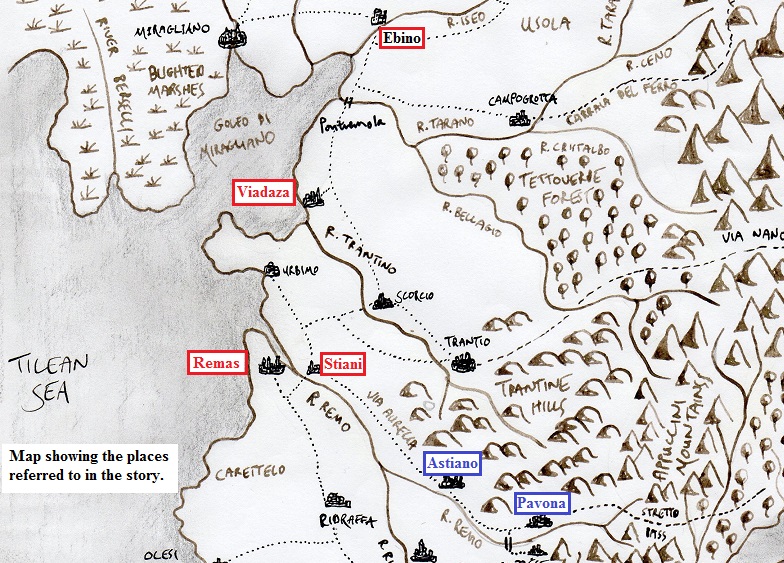
It was a big risk, which nearly every one of the duke’s officers advised against (even if they could not agree what alternative action should be taken). His inactivity meant the very force he had been sent to stop had got between him and what he was meant to be protecting! Luckily, just as news came that the town of Stiani had already been razed to the ground, and it looked like the entire realm might soon be destroyed, Duke Guidobaldo Gondi arrived at the head of the main Pavonan army. It was a force bigger than Scaringella’s, made bigger still when the Pavonans who had come south from Viadaza rejoined their comrades. Several days later the duke’s only surviving son, Lord Silvano, one of the very few who had escaped the terrible defeat at Ebino, also arrived to be reunited with his father.
Then, in an even more welcome (and entirely unexpected) development, the army’s scouts reported that for reasons known only to the ogres, the tyrant Razger Boulderguts and his mercenary ally Mangler had turned southwards rather than striking towards Remas, where the real wealth lay. Had they overestimated the forces defending Remas’ mighty walls? Were they making for the coast and some awaiting ships? Was the sudden change of direction part of a secret agreement with the vampire duchess? Or were they merely taking a detour? Whatever the reason, the allied army now had a chance to do battle with the ogres before they wreaked any further destruction upon the realm.
…
Other than the clattering of their layers of steel armour, the dwarfs marched in silence. They were armed with strangely short spears, of a sort that could be used as a blade like a short sword, but were better at thrusting out between the interlocked iron of a shield-wall. The dwarfs had become a common sight on the streets of Remas, and since their incorporation into the city’s standing army, the dwarfen quarter had swelled considerably in size. There had been mutterings in the army that the dwarfs were surely not happy to be allied with a Pavonan army, what with Duke Guidobaldo’s expulsion of every dwarf in his realm two years ago. The dwarfs themselves, however, had apparently said nothing concerning the matter to anyone else. Bernado suspected that rather than anger, it was mirth they were concealing – being secretly satisfied at the Pavonan soldiery’s discomfort. If the Pavonans disliked merely camping and marching beside dwarfs, then what did they make of the prospect of relying on them in battle? Perhaps the dwarfs intended to shame the Pavonans with their sturdy prowess and hardy discipline upon the field of battle?
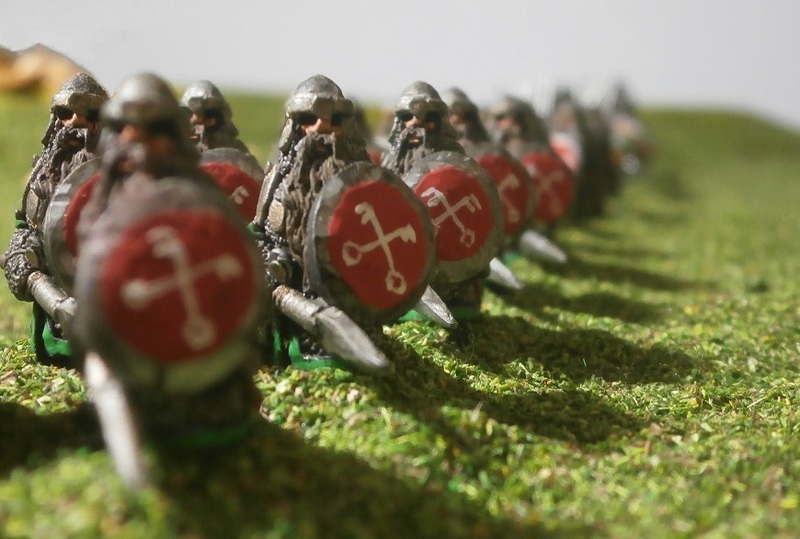
It was late in the afternoon, which on any other march would mean the army should be halting soon. Not this army though. If the last four days were anything to go by, they would march until it grew properly dark. Ogre legs were longer than those of men.
Despite being distracted by the discomfort of riding a mule (the traditional mount for a lector), and worrying about the forthcoming battle, Bernado had been attempting to think clearly about the situation in Remas, to decide what his best course of action would be. He had learned of his election only two days ago, the news being delivered by a lowly, but respected and trusted priest named Benvenuto, who had killed his horse in his haste to bring the news. Benvenuto also described the recent violent events in the city. Since then, due to the consequences of the civil unrest, the speed of the march and the fact that the army of ogres ahead were burning a path through the realm, killing (and eating) just about everyone they encountered, he had learned nothing more. Still, what he already knew was enough to fill him with concerns.
“Brother Duarte,” he asked the young cleric riding beside him. “Do you think Father Carradalio will harm the overlord?”
As usual, Duarte did not answer immediately. He was a careful, disciplined thinker, of a philosophical bent, and not one to rush to answer even when asked by the arch-lector himself.
“It seems to me most likely, your Holiness, that Father Carradalio was furious at not being elected, especially when he had already acted as if he
were arch-lector. He’d played his hand in seizing the city, blood had flowed in every street. Without the legitimization of election, he is no more than a heretical revolutionary, and his Disciplinati become wild rebels overthrowing the rightful order instead of the city’s saviours. Until the election, all had gone well for him, the result of his planning and preparation. Now, however, he has been forced to think on his feet, to act more rashly. He has gone so far it is too late to retreat, and this makes him desperate. If he could have taken you hostage, your Holiness, then I think he would have done so. Instead he took Overlord Matuzzi, the next best thing. Perhaps even better? But I do not think he would harm the overlord, not now his fury has had time to abate. He needs Lord Matuzzi. He needs his authority, so that he can rule the realm by decree as well as by force and fear. That will make him harder to displace.”
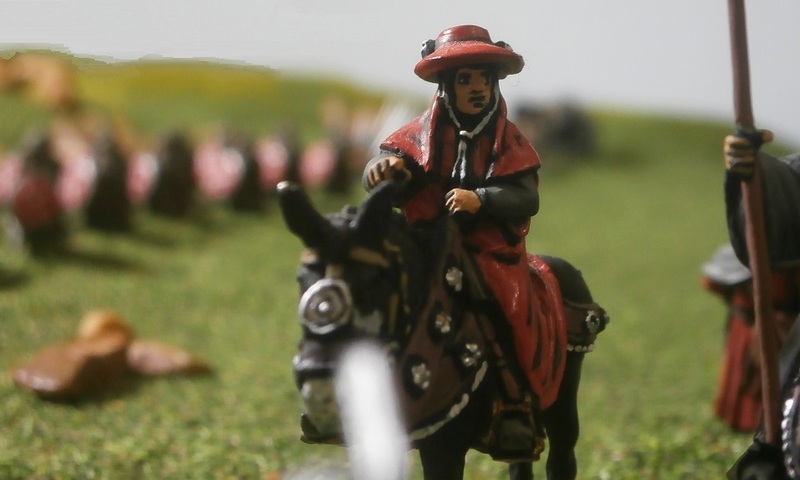
Bernado had already been thinking along similar lines. Overlord Matuzzi had handed over the reins of secular power to Calictus II, Bernado’s predecessor, making him ruler of both church and state. Until the election, the big debate had been whether or not the new arch-lector would automatically inherit that secular authority. Now, however, a third player had entered game.
“No doubt,” asked Bernado, “Carradalio intends to persuade the overlord to yield authority to him?”
“I believe so, your Holiness. He already has the city. He already has nearly all the lower clergy. The people’s fear of the vampires in the north means he most likely has the citizens’ hopes also. With the overlord’s authority, he will have no need of the arch-lectorship.”
“He would have me become a ceremonial puppet while he wields all the real power,” said Bernado.
Although perhaps, he thought to himself, a demagogue like Carradalio and his fanatical Disciplinati were exactly what Remas needs? He had seen so many flee from the undead at Pontremola, and knew full well the final victory had been because of General D’Alessio’s bravery and skill alone. Yet only last night he had heard young Lord Silvano telling of the battle at Ebino - how the flagellants had plunged deep into the enemy’s line and died fighting to the last despite the many monstrous horrors in the duchess’s army, and regardless of the everyone else’s flight. What could a whole army of fanatics do? Perhaps such warriors were Tilea’s only real chance against the vampires? He missed the council of Father Biagino, a man who had both the gift of prophecy and a mind sharp enough to avoid ill-thought or hasty assumptions. When he had asked Lord Silvano about Biagino’s fate in the battle at Ebino, the young noble simply said he never saw nor heard of the priest since that day, and so thought it most likely he perished amongst the multitude.
“Are you well, your Holiness?” asked Duarte, concerned at Bernado’s posture, his frown obscured by his hand clutching at his temples. The arch-lector had been so deep in thought he had not realised what he was doing.
“Yes, brother. Long days, that is all. Pray thee, we shall stop a moment.”
Durate gave the command, and those fore and aft of the arch-lector came to a halt.
The parallel column of dwarfs continued its march, while Bernado turned his mule to face the two priests on foot behind, and Brother Duarte followed suit.
“Father Benvenuto,” said the arch-lector. “Do you know why the lectors voted for me?”
“I would not presume to say, your holiness,” answered the priest. “Apart from to accept that whatever their reasons, it was ultimately Morr’s will that you become so.”
Benvenuto wore a grey, hooded cloak, and despite his sturdily built frame, leaned ponderously, bent-backed, upon a staff. The heavy, leather bags hanging at his waist were at least partially to blame, but he would not allow them to be put onto the cart. When the priest had reached in to withdraw the letters he was carrying, Bernado had seen weighty tomes inside, dark leather embossed with gold leaf. Holy books, or perhaps ledgers of some kind? Bernado assumed he would discover the truth should Father Benvenuto feel the need to employ them.
“Morr’s will, yes. And I pray I shall live up to his expectations,” said Bernado. “But still, presently we abide in the world of mortals and it is men I must measure, not the majesty of Morr. So, Father, if you had to hazard a guess, what would you say was their motive.”
“Fear, your holiness. They are afraid of Father Carradalio and his fanatics.”
“If so, then why choose me in particular?” said Bernado. “Surely there are several lectors in Remas just as capable of putting Carradalio in his place?”
“Maybe so my lord,” agreed the old priest. “But they also fear the vampires. You are the only one amongst them who has met the undead armies in battle. You guided the Viadazan crusaders to their victory at Pontremola …”
“Yet Viadaza, my own see, was lost that very same week,” interrupted Bernado. He felt no joy at the irony.
But Father Benvenuto had not finished. “And then, your holiness, you were by Calictus’s side when Viadaza was retaken and cleansed. You were part of not one but two great victories. In the first he vampire duke died, and in the second you chased Lord Adelfo from the city. The lectors want a proven soldier of Morr leading the church and Remas in the great fight, not an untried rabble rouser like Carradalio.”
“That may be so. Yet Viadaza has most likely fallen once more, this time for good, which would have made me the lector of nowhere.”
“By your leave, your holiness,” said Duarte. “The lectors may well have been counting on its fall. If Viadaza is lost, then there would be nothing to distract you from defending Remas. I have heard them whisper that Calictus erred in dividing our forces, then marching north himself with only a small portion of our full strength, there to be defeated. When he finally fought, half his army were Arabyan mercenaries who barely knew of Morr. They weren’t even under contract to Remas, and fled the field before the battle was decided. Now Stiani has burned because Captain-General Duke Scaringella was left with far too small an army to stop the ogres.”
“If I might speak, your holiness?” asked Brother Marsilio, the grey robed monk who had accompanied Father Benvenuto from Remas. “The lectors knew you were with the captain general. Once the brute’s double army is defeated, then both you and he will be returning victorious with an army. How could Carradalio’s screeching sermons compete with the commands of Morr’s anointed pontiff? How could his crazed followers stand against a real army?”
Ah, thought Bernado, but what sort of army will we return with? If we are badly mauled in this coming battle, only the battered rump of an army might remain. And even if sufficient force survived to contend with the Disciplinati’s fanatics, would Duke Scaringella do the right thing and restore the proper order?
When he spoke again, he hid all sign of these doubts from his voice. “After you delivered your news to me, Father Benvenuto, you spoke at length with our Captain General, yes?”
“I did, your holiness,” the priest answered.
“I take it he questioned you concerning Remas?” inquired Bernado.
“At length, your holiness. And kept me there when he spoke to his officers, that I might answer whatever else he and they thought to ask. I was given to understand that I must not speak of what I had heard.”
Although Bernado had seen the Captain General since that meeting, when both Scaringella and Duke Guidobaldo came to receive his official blessing (as their new arch-lector), he had not yet had the opportunity to speak with Scaringella privately. He doubted the general would want to discuss the precarious state of Reman affairs in the Pavonans’ presence, especially in light of the unexplained delay – lasting the best part of a day - which occurred the previous week.
During that day, as they waited for the Pavonans, Scaringella had confided to Bernado his suspicion that Duke Guidobaldo did not actually intend to fight the ogres and was considering some other action instead. Perhaps the captain general had the measure of Duke Guidobaldo of Pavona? Yet he also admitted he could not fathom why Guidobaldo would consider allowing those who had injured him so badly to escape. Fearing his dangerous gamble had failed, Scaringella had knelt to pray with Bernado for Remas, pleading with Morr not to allow it to suffer at the hands of brutes when the most holy work of destroying the vampires was yet to be done. That evening, however, Duke Guidobaldo called a council of war, giving no explanation for the delay, and declared that they would pursue the enemy immediately as if nothing strange had happened.
Although Duke Scaringella accepted Guidobaldo had the larger force and so was due the precedence, he was neither asked nor offered to swear obedience to Duke Guidobaldo, being himself was of equal noble rank and a captain-general (which suited him well in light of his distrust). Instead, he simply offered to fight at Duke Guidobaldo’s side, promising to cooperate fully upon the field of battle, doing his utmost to contribute to victory. The matter of dividing the spoils was not discussed for the chase was on and there was no (more) time to waste. Most of the soldiers seemed to presume that as most of the plunder came from Pavonan settlements, then the Pavonans would expect the lion’s share.
Considering Duke Scaringella’s religiosity and apparent acceptance of spiritual authority, Bernado had every reason to think Scaringella’s command concerning Father Benvenuto’s silence was more to prevent the Pavonans learning of his concerns. In light of this, he made the Morrite sign, and spoke,
“I hereby absolve you of any promise you made to keep silent. As your pontiff, I command that you answer me.”
Father Benvenuto nodded his acceptance.
“Did Lord Scaringella voice his opinion concerning Father Carradalio and his dedicants?” Bernado asked.
“He spoke of little else, your holiness, and was in quite a dilemma. He must defend Remas, of course, either by destroying the ogres or chasing them away. His victory must be glorious, so he can return to Remas as a hero, winning the citizens’ favour. He must earn a good portion of the loot so that he can feed and pay the army; and he must prove to be so effective on the field of battle that the Pavonan duke is grateful, becoming an important ally during the struggle ahead. Yet he must do all these things without suffering crippling losses, for he will need the army to put the Disciplinati di Morr back in their place upon your return to Remas.”
“More than that,” Duarte added, “we need the army to fight the vampires.”
Ogres, fanatics and the undead, thought Bernado. Not one but three wars to be fought!
“Brethren,” he said, “let us contend with one thing at a time. Tonight, we shall pray for victory against the brutes.”
To see the Battle Report click on viewtopic.php?p=85926#p85926

